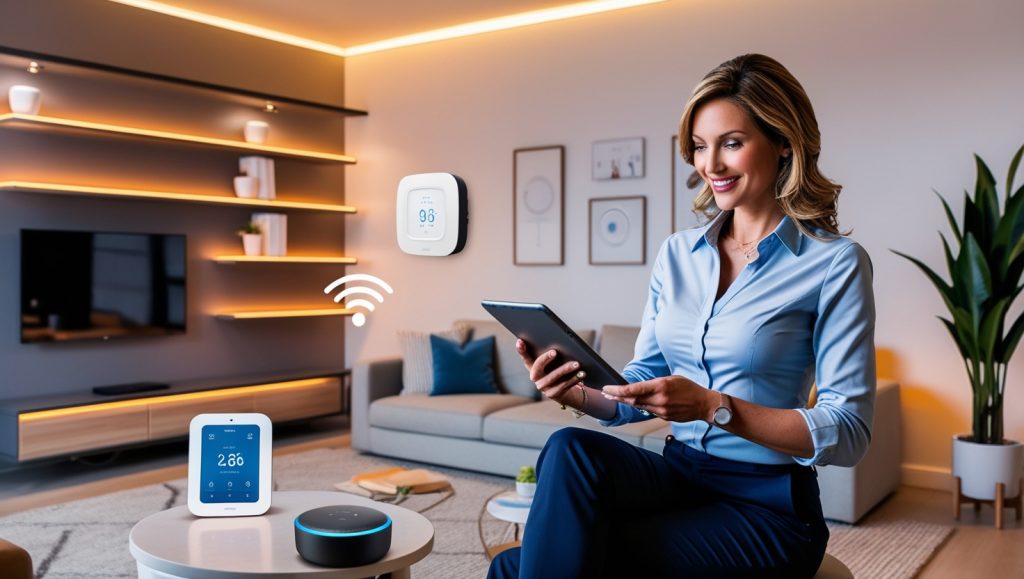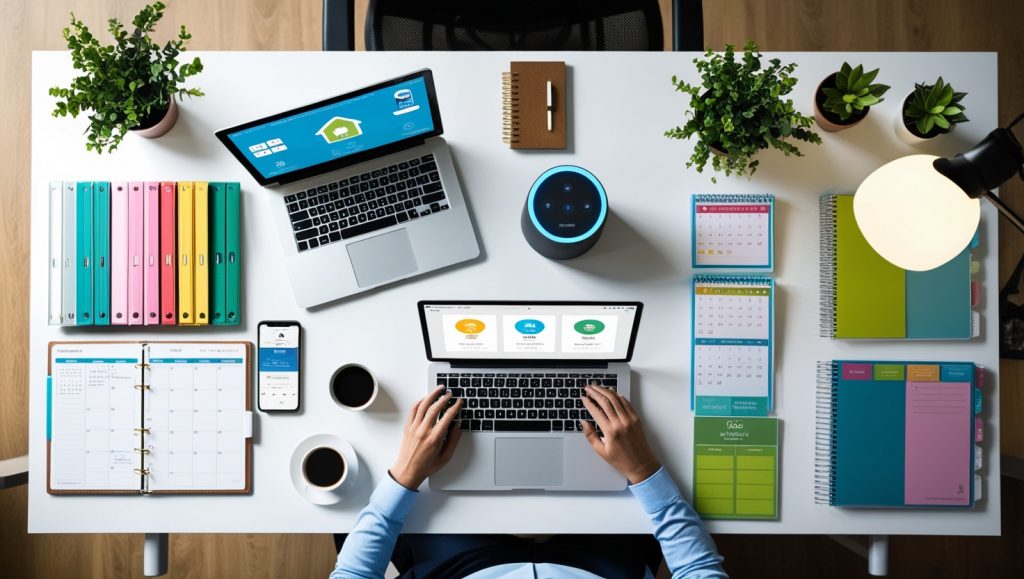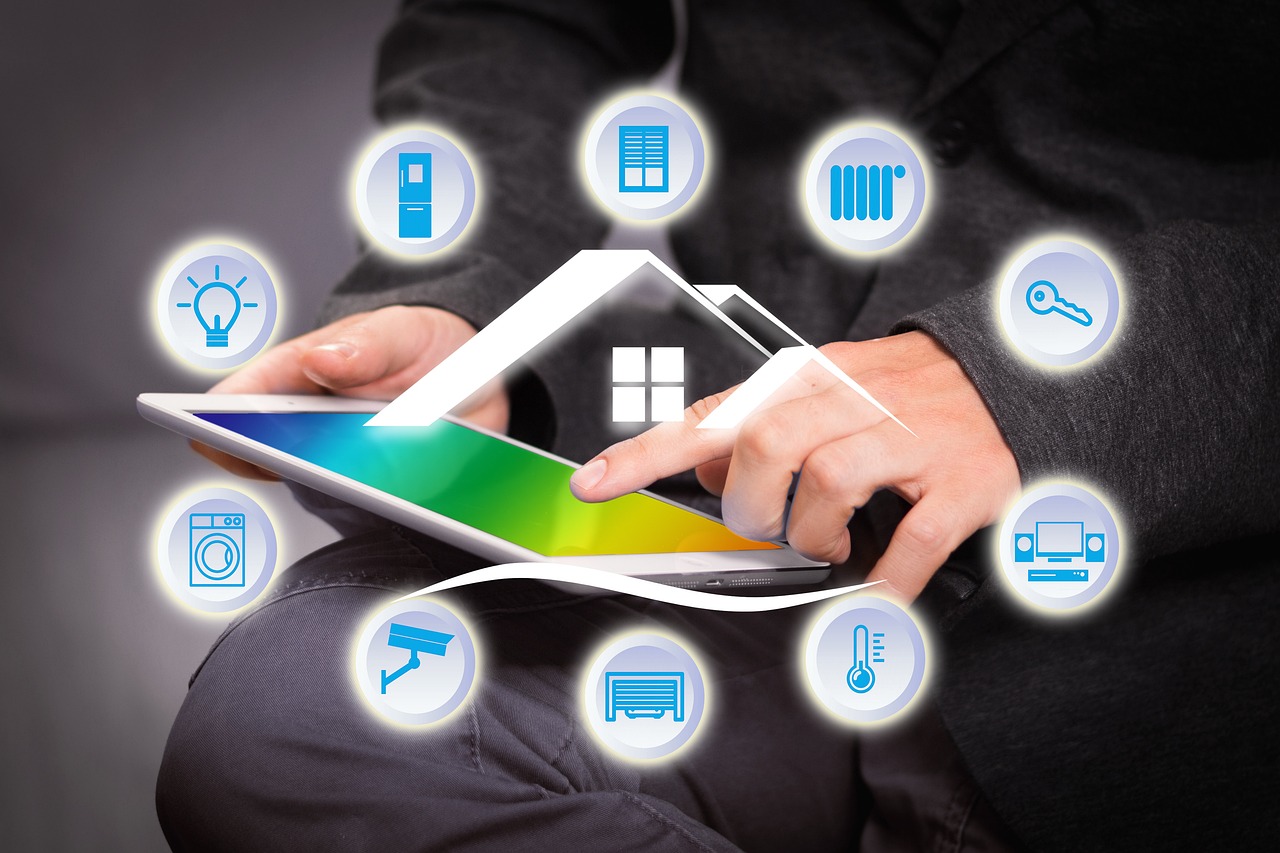In today’s fast-paced world, to have a smart home management efficiently has become both an art and a science. Smart home management goes beyond traditional housekeeping it’s about creating intelligent systems that streamline your daily routines, maximize your time, and enhance your quality of life. When implemented thoughtfully, these strategies transform your living space into a well-oiled machine that supports your personal and professional goals.
The Digital Revolution in Smart Home Management
Modern technology has revolutionized how we approach home organization. Smart home devices, automation systems, and digital tools have made it possible to manage household tasks with unprecedented efficiency. From programmable thermostats that adjust temperature based on your schedule to smart security systems that provide peace of mind, technology integration is no longer a luxury it’s a necessity for efficient home management.
Consider implementing smart lighting systems that automatically adjust throughout the day, reducing energy consumption while creating the perfect ambiance for different activities. Smart speakers can help you set reminders, create shopping lists, and even control other connected devices with simple voice commands. These technological solutions free up mental bandwidth, allowing you to focus on what truly matters.

Building Your Smart Home Ecosystem: A Room by Room Approach
Creating an effective smart home management system requires strategic planning for each space in your home. Rather than implementing technology randomly, take a methodical approach that addresses the unique needs of different areas.
Kitchen Automation and Efficiency: The kitchen benefits tremendously from smart integration. Smart refrigerators can track inventory, suggest recipes based on available ingredients, and alert you when items are nearing expiration. This reduces food waste and streamlines meal planning. Install smart outlets for small appliances, allowing you to schedule coffee makers, slow cookers, and other devices to operate during off-peak energy hours or to shut off automatically for safety.
Consider smart faucets that conserve water through precise flow control and touchless operation, particularly valuable when handling raw meat or messy ingredients. Smart lighting under cabinets improves food preparation safety while creating ambiance for dining. Voice-activated timers and measurement conversions make cooking more efficient, freeing your hands for actual food preparation.
Living Room Smart Integration: Transform your living room into a comfort hub with smart thermostats that learn your preferences and adjust automatically. These devices can detect when rooms are occupied, preventing energy waste in empty spaces. Smart window treatments automatically adjust based on sunlight intensity, reducing cooling costs in summer and maximizing natural warmth in winter.
Entertainment systems benefit from universal remote controls and voice commands, eliminating the frustration of multiple remotes and complicated setups. Smart speakers serve as central hubs for controlling various devices while providing entertainment, information, and communication capabilities.
Bedroom Optimization for Rest and Recovery: Quality sleep forms the foundation of effective home management. Smart mattresses and sleep trackers provide insights into sleep patterns, helping you optimize your bedroom environment. Programmable lighting that gradually dims in the evening and brightens in the morning supports natural circadian rhythms, improving sleep quality and morning alertness.
Smart alarm systems for bedrooms can detect motion and send alerts when children leave their rooms at night. White noise machines with app control allow customization based on environmental noise levels, ensuring consistent sleep quality regardless of external disturbances.
Bathroom Smart Solutions: Water conservation and energy efficiency in bathrooms significantly impact utility costs. Smart shower systems allow you to preset water temperature and flow rate, preventing water waste while the shower reaches desired temperature. These systems can also track water usage, helping you identify opportunities for conservation.
Smart mirrors with built-in lighting, weather displays, and news updates streamline morning routines. Automatic fan systems that activate based on humidity levels prevent mold growth and improve air quality. Smart scales and health monitors integrated with your smartphone track wellness metrics, supporting health-focused home management.
Home Office Productivity Enhancement: For remote workers, smart home office integration dramatically improves productivity. Automated standing desks remind you to alternate between sitting and standing, supporting physical health during long work sessions. Smart lighting adjusts color temperature throughout the day, cooler tones for focused work in the morning, warmer tones for afternoon tasks, reducing eye strain and supporting natural energy rhythms.
Air quality monitors ensure proper ventilation, alerting you when carbon dioxide levels rise and fresh air is needed. This is particularly important in sealed, climate-controlled spaces where air circulation may be inadequate. Noise-canceling systems and smart soundproofing solutions create professional environments for video calls and focused work.
Advanced Organization Systems
Creating sophisticated a smart home management organizational systems requires understanding your unique lifestyle patterns. Start by conducting a thorough audit of your daily routines, identifying bottlenecks and inefficiencies. Document when you perform certain tasks, how long they take, and what obstacles you encounter.
Implement the “one-touch rule” for managing paperwork and digital files. When you encounter a document, deal with it immediately file it, act on it, or discard it. This prevents accumulation of clutter and reduces decision fatigue. Create digital filing systems that mirror your physical organization, ensuring seamless transitions between online and offline tasks.
Financial Management Integration for Smart Homes
Smart home management extends beyond physical organization to include financial optimization. Understanding the economic impact of your home management decisions creates sustainable systems that support long-term financial health.
Budgeting for Smart Home Technology: Approach smart home investments strategically rather than impulsively. Create a tiered implementation plan that addresses your highest-priority needs first. Essential systems like security, climate control, and lighting typically provide the fastest return on investment through energy savings and increased safety.
Calculate potential savings from each device before purchasing. Smart thermostats, for example, typically pay for themselves within two years through reduced energy consumption. Energy monitoring systems provide detailed insights into which appliances consume the most electricity, allowing you to make informed decisions about upgrades or usage patterns.
Consider the total cost of ownership, including installation, maintenance, and potential subscription fees for cloud storage or advanced features. Some systems require professional installation, while others offer straightforward DIY setup. Factor these costs into your budget planning.
Utility Cost Optimization: Smart home technology excels at reducing utility expenses through precise control and optimization. Time-of-use electricity plans charge different rates throughout the day, with lower costs during off-peak hours. Smart systems can automatically shift energy-intensive tasks like laundry, dishwashing, and electric vehicle charging to these cheaper periods.
Water heaters represent significant energy consumers in most homes. Smart water heaters learn your usage patterns and heat water only when needed, rather than maintaining constant temperature. This targeted approach can reduce water heating costs by 10 to 15 percent annually.
Leak detection systems prevent catastrophic water damage that costs thousands in repairs. These sensors alert you immediately to unusual water flow, allowing quick intervention before minor leaks become major problems. The peace of mind alone justifies the modest investment, but the potential savings from prevented damage make these devices extremely valuable.
Maintenance Cost Reduction: Preventive maintenance costs far less than emergency repairs. Smart home systems support proactive maintenance through automated reminders and condition monitoring. HVAC systems with smart sensors alert you when filters need changing, preventing efficiency loss and equipment damage caused by dirty filters.
Appliance monitoring systems detect unusual patterns that indicate impending failure, allowing you to schedule repairs before complete breakdown. This prevents the premium costs associated with emergency service calls and the inconvenience of suddenly non-functional essential appliances.
Create digital maintenance logs that track all home systems, recording service dates, parts replaced, and costs incurred. This documentation helps identify patterns, supports warranty claims, and provides valuable information for future homeowners if you sell.
Insurance Benefits and Risk Mitigation: Many insurance companies offer discounts for homes equipped with smart security and safety systems. Monitored alarm systems, smart smoke detectors, and water leak sensors demonstrate risk reduction, justifying lower premiums. Document your smart home safety features and discuss potential discounts with your insurance provider.
Smart cameras and doorbell systems not only deter potential intruders but also provide evidence in case of theft, vandalism, or accidents on your property. This documentation protects you from fraudulent liability claims and supports legitimate insurance claims with time-stamped evidence.
Strategic Time Management
Effective home management requires mastering the art of time blocking and priority matrix techniques. Allocate specific time slots for different categories of tasks administrative work, maintenance, family time, and personal care. This prevents important activities from being overshadowed by urgent but less significant tasks.
Introduce batch processing for similar activities. Instead of doing laundry throughout the week, designate specific days for different types of washing. Group errands geographically to minimize travel time and fuel consumption. This systematic approach reduces context switching and increases overall efficiency.
Creating Resilient Systems: Backup Plans and Redundancy
Effective smart home management includes preparation for system failures, internet outages, and technology malfunctions. Building redundancy into your systems ensures continued functionality even when primary systems fail.
Power Backup Solutions: Smart homes depend on electricity, making power outages particularly disruptive. Uninterruptible power supplies (UPS) for critical systems like security equipment, internet modems, and communication devices ensure these essentials remain operational during outages. Size your UPS systems appropriately, calculating total wattage requirements and desired runtime.
Whole-home generators represent significant investments but provide comprehensive protection for areas with frequent power disruptions. Modern smart generators automatically start when power fails, seamlessly maintaining home systems. For moderate climates, battery backup systems paired with solar panels provide sustainable emergency power without fossil fuel dependence.
Internet Connectivity Redundancy: Many smart home systems rely on internet connectivity for remote access and cloud processing. Cellular backup connections ensure your security systems, cameras, and critical alerts continue functioning even if primary internet service fails. These systems automatically switch to cellular data when they detect internet disruption, providing seamless continuity.
Local processing capabilities in newer smart home devices reduce dependence on cloud services. Choose systems that store recordings locally and can operate in offline mode when internet connectivity is unavailable. This approach provides greater privacy while ensuring basic functionality during network outages.
Manual Override Systems: Every automated system should include intuitive manual controls. Smart locks must have physical key backups, automated window treatments should operate manually if motors fail, and smart thermostats should allow direct temperature adjustment. These failsafes prevent minor technical issues from becoming major inconveniences.
Document manual override procedures for all systems and ensure all household members understand how to operate devices manually. This knowledge proves invaluable during emergencies, system malfunctions, or when technology-averse guests visit.
Data Backup and Privacy Protection: Smart home systems generate significant data about your habits, schedules, and home occupancy. Protect this sensitive information through regular backups and strong security practices. Use strong, unique passwords for all devices and accounts, enabling two-factor authentication wherever possible.
Regularly update device firmware to patch security vulnerabilities. Manufacturers discover and fix security issues constantly, but these fixes only protect you if you actually install updates. Enable automatic updates for devices that support this feature, or establish monthly routines for manual update checks.
Create separate network segments for smart home devices, isolating them from computers containing sensitive personal or financial information. This network segregation limits potential damage if smart home devices are compromised. Guest networks provide internet access for visitors without exposing your primary network.
Emergency Protocol Development: Establish clear protocols for various emergency scenarios. Create step-by-step guides for system resets, internet troubleshooting, and contacting technical support. Store these guides both digitally and in hard copy, since you may need them when digital systems are unavailable.
Maintain a list of critical service contacts, including internet service providers, security monitoring companies, and smart device manufacturers. Having these numbers readily available prevents frantic searching during stressful situations.
Practice emergency procedures regularly, similar to fire drills. Test backup systems quarterly to ensure they function properly when needed. Replace backup batteries before they expire, and verify that generators start reliably. This proactive testing identifies problems before emergencies occur.
Energy and Resource Optimization
Smart home management extends to optimizing energy consumption and resource utilization. Implement energy efficient practices that reduce utility bills while supporting environmental sustainability. Use programmable appliances during off-peak hours when electricity rates are lower.
Create seasonal maintenance schedules that prevent costly repairs and extend the lifespan of your home’s systems. Regular HVAC servicing, gutter cleaning, and appliance maintenance should be scheduled based on manufacturer recommendations and seasonal requirements.
Seasonal Adaptation and Long-Term Planning
Effective smart home management requires adapting systems to seasonal changes and planning for long-term home evolution. Static systems quickly become outdated or inefficient as circumstances change.
Spring Preparation and Renewal: Spring represents the ideal time for comprehensive home system evaluation. Inspect weather stripping, caulking, and insulation, addressing any damage that developed during winter. Clean or replace HVAC filters, preparing air conditioning systems for increased summer usage. Schedule professional inspection of cooling systems to identify potential issues before hot weather arrives.
Garden and outdoor systems require attention as temperatures rise. Smart irrigation controllers adjust watering schedules based on local weather conditions, soil moisture, and plant needs. These systems prevent overwatering during rainy periods while ensuring adequate moisture during dry spells. Gradually introduce outdoor smart lighting as days lengthen, programming lights to adjust automatically with changing sunset times.
Deep clean carpets, upholstery, and curtains, removing accumulated dust and allergens. Open windows during mild weather to flush stale indoor air, improving air quality without energy-intensive mechanical ventilation. This natural ventilation also helps identify any moisture issues or odors that developed during sealed winter months.
Summer Efficiency Maximization: Summer brings peak energy costs due to air conditioning demands. Smart thermostats optimize cooling by learning your schedule and preferences, precooling homes during cheaper off-peak hours and reducing cooling when buildings are unoccupied. Window coverings automatically close during peak sun exposure, reducing cooling load significantly.
Outdoor entertainment spaces benefit from smart controls. Programmable outdoor lighting, sound systems, and climate control for covered patios extend usable hours into comfortable evening periods. Mosquito control systems activated by motion sensors protect outdoor areas without constant chemical exposure.
Monitor and maintain outdoor equipment including lawnmowers, pool systems, and outdoor appliances. Clean air conditioner coils and surrounding areas, ensuring proper airflow and efficient operation. Inspect roofing and gutters for damage from spring storms, preventing small issues from becoming major problems during summer rain events.
Fall Winterization and Preparation: Autumn requires preparing homes for cold weather and potential storms. Reverse ceiling fans to push warm air downward, improving heating efficiency. Clean and inspect fireplace and chimney systems if you use wood heat. Test heating systems before cold weather arrives, when repair technicians are less busy and parts are readily available.
Drain and store garden hoses, shut off exterior water supplies, and insulate exposed pipes to prevent freeze damage. Clean gutters thoroughly, preventing ice dams that damage roofs and create dangerous icicles. Apply weather stripping to doors and windows, sealing gaps that waste heated air.
Smart home systems should shift focus from cooling to heating optimization. Update thermostat schedules for shorter days and longer nights. Program outdoor lighting to accommodate earlier darkness, improving safety and security during evening hours.
Winter Comfort and Safety: Winter brings unique challenges requiring specific smart home adaptations. Ice and snow sensors on driveways and walkways activate heating systems, preventing dangerous accumulation. Smart doorbells with video allow you to screen visitors without opening doors and losing heat.
Indoor air quality becomes critical during winter when homes remain sealed against cold. Air purifiers and humidity control systems maintain comfortable, healthy indoor environments. Monitor humidity levels, as excessively dry air damages wood furniture and causes health issues, while too much moisture encourages mold growth.
Emergency preparedness becomes paramount during winter storms. Ensure backup heating sources are available and safe. Stock emergency supplies including flashlights, batteries, water, and non-perishable food. Test generator systems and verify fuel availability. Smart monitoring systems alert you to temperature drops that could indicate heating system failure, allowing intervention before pipes freeze.
Long-Term Evolution Planning: Your home and lifestyle will evolve over time, requiring adaptive smart home systems. Plan for future needs including aging in place modifications, growing families, or potential home-based businesses. Choose expandable systems that accommodate additional devices and capabilities without complete replacement.
Document all smart home systems including model numbers, purchase dates, warranty information, and setup procedures. This documentation proves invaluable during troubleshooting, insurance claims, or home sales. Create a digital home manual that future owners can reference, adding value to your property.
Stay informed about emerging smart home technologies, but avoid compulsive upgrading. Evaluate new products based on genuine need and return on investment rather than novelty. Some innovations genuinely improve life quality or efficiency, while others represent solutions searching for problems.
Communication and Coordination

For households with multiple occupants, establishing clear communication protocols is essential. Create shared digital calendars that synchronize across all family members’ devices. Use project management apps to assign and track household responsibilities, ensuring accountability and preventing tasks from falling through the cracks.
Develop family meeting routines to discuss upcoming schedules, address concerns, and make collective decisions about household management. This democratic approach ensures everyone feels invested in maintaining an organized home environment.
Measuring Success and Continuous Improvement of Digital Revolution.
Implement metrics to evaluate the effectiveness of your home management systems. Track time saved, stress levels, and overall satisfaction with your daily routines. Use this data to make informed adjustments and optimizations.
Regular system reviews help identify areas for improvement and ensure your management strategies evolve with changing life circumstances. What works for a young professional may need adjustment when children arrive or when transitioning to remote work.
“If you want to keep your home organized beyond technology, also check out our article How to Keep Your Home Clean and Organized in Just 15 Minutes Daily”.
Troubleshooting Common Smart Home Challenges
Even well-designed smart home systems encounter occasional problems. Understanding common issues and their solutions prevents minor annoyances from becoming major disruptions.
Connectivity and Network Issues: Wireless connectivity problems represent the most frequent smart home complaints. Weak WiFi signals in certain areas prevent reliable device communication. WiFi mesh systems extend coverage throughout large homes, eliminating dead zones. Position main routers centrally and elevate them for better signal propagation. Avoid placing routers in cabinets, basements, or near large metal objects that block signals.
Network congestion occurs when too many devices compete for limited bandwidth. Modern routers support dual-band or tri-band operation, separating device traffic onto different frequencies. Dedicate the 5GHz band to bandwidth-intensive devices like security cameras and streaming systems, while basic sensors and switches use the 2.4GHz band.
Regularly restart your router and modem to clear cached data and refresh connections. Monthly reboots prevent many random connectivity issues. Update router firmware periodically, as manufacturers continually improve performance and security through software updates.
Device Compatibility and Integration Problems: Not all smart devices work together seamlessly. Before purchasing, verify compatibility with your existing ecosystem. Devices supporting common protocols like Zigbee, Z-Wave, or Matter typically integrate more smoothly than proprietary systems. Central hubs from major manufacturers (Amazon, Google, Apple) support wide ranges of devices but may limit advanced features of third-party products.
When devices refuse to connect or respond erratically, remove and re-add them to your system. This fresh pairing often resolves communication glitches. Ensure all devices run current firmware, as manufacturers frequently release compatibility updates. Check manufacturer websites or apps for troubleshooting guides specific to your devices.
Physical distance between devices and hubs can cause communication failures. Zigbee and Z-Wave create mesh networks where devices relay signals, extending range. Position powered devices strategically to create strong mesh networks, particularly in larger homes or properties with detached structures.
Automation and Scheduling Failures: Automated routines occasionally fail to trigger or execute improperly. Time-zone settings frequently cause scheduling problems, particularly after daylight saving time changes. Verify that all devices and hubs use correct time zones and update automatically for daylight saving transitions.
Conditional automation based on multiple triggers may fail if any single condition isn’t met. Review automation logic carefully, ensuring realistic trigger conditions. Weather-based automations require accurate location settings and may fail if cloud services are disrupted.
Some systems limit the number of simultaneous automations or devices in single routines. If automations become unreliable, simplify them by breaking complex routines into smaller, focused automations. This modular approach also makes troubleshooting easier when problems occur.
Voice Control Misunderstandings: Voice assistants sometimes misinterpret commands or execute unexpected actions. Use specific, consistent phrasing when issuing voice commands. Avoid similar names for different devices to prevent confusion. If “office light” and “hallway light” cause problems, rename them to clearly distinct names like “desk lamp” and “corridor light.”
Train voice assistants by providing feedback when they misunderstand. Most systems allow you to review command history and correct mistakes, improving future recognition. Position voice assistants away from noise sources like televisions or speakers to improve recognition accuracy.
Multiple voice assistants in the same space can cause conflicts. Establish which assistant handles which tasks, or use wake words that prevent accidental activation. Mute assistants when playing media to prevent them from misinterpreting audio as commands.
Security Concerns and Breach Prevention: Smart home security extends beyond physical safety to digital protection. Change default passwords immediately on all new devices, as these are widely known and easily exploited. Create strong, unique passwords using password managers rather than trying to memorize them.
Regularly review device access permissions, removing unused accounts or outdated authorizations. Check which devices have access to your network and remove any you don’t recognize. Unknown devices might indicate security breaches or simply forgotten gadgets, but either warrants investigation.
Enable automatic security updates wherever possible. Many smart home breaches exploit known vulnerabilities that have been patched, but only if users install updates. Set calendar reminders for manual update checks if automatic updates aren’t available.
Monitor your network for unusual activity. Sudden increases in internet usage, devices turning on or off unexpectedly, or unfamiliar devices appearing in your network list warrant immediate investigation. Most router management apps allow you to monitor connected devices and block suspicious connections.
When to Seek Professional Help: Some problems require professional expertise. Electrical issues, structured wiring installations, and whole-home integration projects typically exceed DIY capabilities. Professional installers also provide valuable consultation on system design and product selection.
Many manufacturers offer technical support via phone, chat, or email. Before contacting support, document the problem including when it started, what you were doing, any error messages, and what you’ve tried. This information helps technicians diagnose issues quickly.
Local smart home installation companies often provide consultation services even if you’re not hiring them for installation. Their experience with various products and systems provides valuable insights into which solutions work well in your area and home type. Consider paying for professional consultation before making major smart home investments.
CONCLUSION:
Smart home management is an investment in your well-being and productivity. By implementing these advanced strategies, you create an environment that not only functions efficiently but also supports your broader life goals. Remember that perfection isn’t the goal consistency and adaptability are the keys to long-term success in home management. Start with small, manageable changes and allow your systems to evolve as your needs change. Your organized, efficient home will become the foundation for a more balanced, fulfilling life.
Looking for comprehensive guidance on caring for your baby? Our book ‘How to Care for Children: From Birth to Age 2’ combines professional nanny experience with evidence based child development research. Written by Kelly and Peter, this guide provides clear, reliable advice rooted in real world childcare. Available in English, Spanish, and Portuguese on Amazon.
Click the link below your preferred language to get your copy!

1. How to manage a smart home efficiently?
To manage a smart home efficiently, create a system that combines automation, routine planning, and energy optimization. Use smart devices for lighting, temperature control, security, and reminders to streamline daily tasks.
2. What are the benefits of smart home technology?
Benefits include time savings, increased security, lower energy bills, improved comfort, and better organization of daily routines.
3. Is it expensive to start a smart home?
Not necessarily. You can start with budget-friendly devices like smart plugs or bulbs and expand as your budget allows.
4. What is the easiest smart home device to start with?
Smart bulbs, smart plugs, and voice assistants are the easiest and most affordable devices for beginners.
5. Can smart home devices help save money?
Yes. By automating energy use, scheduling appliances for off-peak hours, and reducing waste, smart devices can significantly cut utility bills.
6. How can I integrate all my smart devices?
Use a central hub or smart assistant, like Amazon Alexa, Google Home, or Apple HomeKit, to connect and control all devices from one platform.
7. Are smart homes safe from hackers?
They can be, but it’s important to use strong passwords, update devices regularly, and secure your Wi-Fi network with encryption.
8. What are common mistakes in smart home management?
Overcomplicating the system, not updating devices, ignoring maintenance, and not training all household members to use the technology.
9. Do I need to spend a lot of money to have a smart home?
Not necessarily. You can start small with affordable upgrades like smart bulbs or a voice assistant, then expand as your budget allows. The goal is to choose solutions that genuinely simplify your daily life.
10. Where can I find more information on smart devices and energy efficiency?
Want a complete baby care guide?
Get our FREE checklist sent directly to your inbox - covering everything from birth to age 2, including daily routines, safety guidelines, and developmental milestones.
- ✅ Birth to 3 months essentials
- ✅ 4-12 months routines & alerts
- ✅ 1-2 years development & safety
Enter your email to receive instant access to the PDF




